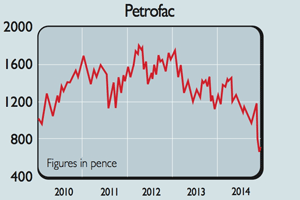Gamble of the day: A turnaround oil play
Everything was going so well for this oil company until recently. Phil Oakley explains why a turnaround could offer big rewards for brave investors.
Get the latest financial news, insights and expert analysis from our award-winning MoneyWeek team, to help you understand what really matters when it comes to your finances.
You are now subscribed
Your newsletter sign-up was successful
Want to add more newsletters?

Twice daily
MoneyWeek
Get the latest financial news, insights and expert analysis from our award-winning MoneyWeek team, to help you understand what really matters when it comes to your finances.

Four times a week
Look After My Bills
Sign up to our free money-saving newsletter, filled with the latest news and expert advice to help you find the best tips and deals for managing your bills. Start saving today!
Until the end of 2013, everythingseemed to be going well for this oil-services company. Its bread-and-butter business of building and maintaining oil platforms was doing nicely and winning orders.
The Integrated Energy Services unit, where itpartnered up with oil companies to operate oil platforms in return for a share of the spoils, was going to keep profits racing ahead. Its shares were well liked by investors.
How fast things can change. Last year, itissued three profit warnings, hammering the share price which has fallen from a high of nearly £15 back in May to just over £7 now.
MoneyWeek
Subscribe to MoneyWeek today and get your first six magazine issues absolutely FREE

Sign up to Money Morning
Don't miss the latest investment and personal finances news, market analysis, plus money-saving tips with our free twice-daily newsletter
Don't miss the latest investment and personal finances news, market analysis, plus money-saving tips with our free twice-daily newsletter
Sure, the falling price of oil has not helped sentiment towards oil companies but it seems that a large chunk of Petrofac's (LSE: PFC)woes has been self-inflicted.
Just over a month ago, Petrofactold investors that it expected its net profits for 2015 to be around $500m. A year ago it said it was on track to make nearly $900m.
So what's gone wrong? A falling oil price means that oilfields tend to make less money. But there have also been teething troubles in getting projects to work properly in places such as Mexico, Romania and the North Sea. A big oil platform project in the Shetlands has also hit problems and will not make any money for Petrofac this year.

If this is true and I'll warn you right now it isn't always then perhaps better days are ahead.
Petrofac has to get its house in order but there are grounds for optimism. It continues to win new orders and in fact has a record order book of just over $21bn (around 3.5 times 2013 revenues). Of course, the low oil price might make oil companies think twice before spending on new rigs and pipelines. They may even cancel contracts. But so far this has not happened.
It's also worth noting that only around 20% of profits are coming from jointly operating oil platforms. If building and maintenance orders turn into the expected revenues and the oil price rebounds, then Petrofac shares at just over seven times 2015 forecast earnings per share (about 95.8p at the current exchange rate) could be cheap.
Last year's dividend per share was just over $0.65 (42.9p at current exchange rates). If the company has the confidence to maintain this when it announces its 2014 results in February, then the 6% yield could attract fresh buyers.
Verdict: risky buy at 711p
Get the latest financial news, insights and expert analysis from our award-winning MoneyWeek team, to help you understand what really matters when it comes to your finances.
Phil spent 13 years as an investment analyst for both stockbroking and fund management companies.
-
 Can mining stocks deliver golden gains?
Can mining stocks deliver golden gains?With gold and silver prices having outperformed the stock markets last year, mining stocks can be an effective, if volatile, means of gaining exposure
-
 8 ways the ‘sandwich generation’ can protect wealth
8 ways the ‘sandwich generation’ can protect wealthPeople squeezed between caring for ageing parents and adult children or younger grandchildren – known as the ‘sandwich generation’ – are at risk of neglecting their own financial planning. Here’s how to protect yourself and your loved ones’ wealth.